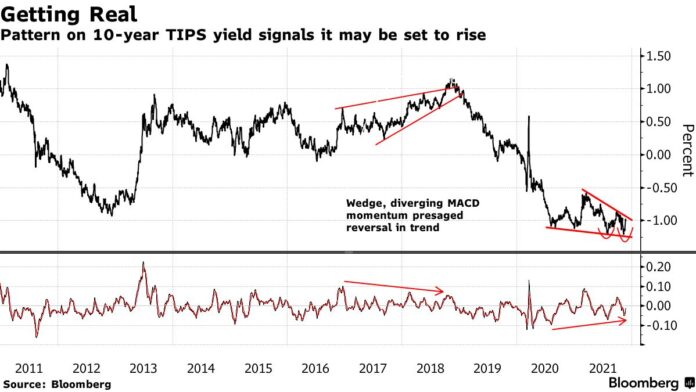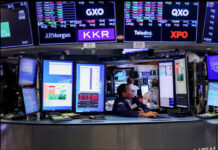
Global stocks and U.S. index futures rose modestly as signs of a solid recovery in the world’s largest economy offset jitters over inflation and a faster tapering of Federal Reserve stimulus.
Trading volumes narrowed around the world as U.S. traders stayed off for the Thanksgiving holiday. The turnover in Asia’s equity benchmark was 17% lower than its 30-day average. It shrank 22% in Europe and as much as 84% in Latin America’s early hours.
In this quiet market, contracts on the S&P 500 and Nasdaq 100 indexes traded at least 0.1% higher, paring some of their earlier advances. MSCI’s benchmark for world stocks rose by a similar degree. The dollar was steady near a 16-month high. Remy Cointreau SA jumped 11% in Europe on an earnings beat. Nickel reversed gains after trading near the highest level in almost a decade.
U.S. stocks proved resilient to a slew of economic data and Fed minutes on Wednesday that supported expectations for a quicker removal of stimulus by the Fed. While inflation concerns deepened, traders were in no mood to miss a play on the U.S. recovery story. Rising bets not only for a quicker taper, but also an earlier liftoff of interest rates, suggest caution may return after Thanksgiving.
“The market mood is rather OK-ish after the minutes,” Ipek Ozkardeskaya, a senior analyst at Swissquote, wrote in a note. “At this point, it makes sense to expect an earlier, and maybe a steeper rate normalization from the Fed.”
European traders shrugged off a worsening Covid-19 situation in the continent. The Stoxx 600 gauge was supported by utilities and real estate companies. Remy Cointreau soared to a record high after the French distiller reported first-half results that Citigroup Inc. called “truly exceptional.”
Nickel fell in London after initially soaring toward the highest level since 2012 on a closing basis.
The dollar remained on course for its fifth weekly rally. Multiple technical patterns, including Fibonacci Retracement, support fundamental drivers helping the currency such as a winding down of excess liquidity in the global markets and concern over a persistent pandemic.
MSCI Inc.’s Asia-Pacific share index snapped a three-day drop. China urged local governments to boost investment to counter a growth slowdown, while the Chinese city of Chengdu sought to ease a cash crunch at property developers. It became the first major local administration to address the liquidity squeeze in the real estate industry, a key component of the economy.
South Korea followed New Zealand in raising interest rates to contain inflation. The won fell amid an uncertain time line for the next hike. The forint posted the biggest gains in emerging markets after Hungary raised the benchmark rate by more than anticipated.
Crude oil slipped after OPEC said a planned coordinated release of reserves by major consuming nations may swell a crude surplus expected early next year.
Here are some key events this week:
- U.S. Thanksgiving Day: U.S. equity, bond markets closed Thursday
- Bank of England Governor Andrew Bailey speaks with Mohamed El Erian at a Cambridge Union event. Thursday
Some of the main moves in markets:
Stocks
- The Stoxx Europe 600 rose 0.2% as of 1:55 p.m. London time
- Futures on the Nasdaq 100 rose 0.2%
- Futures on the Dow Jones Industrial Average were little changed
- The MSCI Asia Pacific Index rose 0.2%
- The MSCI Emerging Markets Index was little changed
Currencies
- The Bloomberg Dollar Spot Index was little changed
- The euro rose 0.2% to $1.1218
- The Japanese yen was little changed at 115.33 per dollar
- The offshore yuan rose 0.1% to 6.3881 per dollar
- The British pound fell 0.1% to $1.3312
Bonds
- Germany’s 10-year yield declined one basis point to -0.24%
- Britain’s 10-year yield declined two basis points to 0.97%
Commodities
- Brent crude fell 0.2% to $82.12 a barrel
- Spot gold rose 0.1% to $1,790.60 an ounce

















